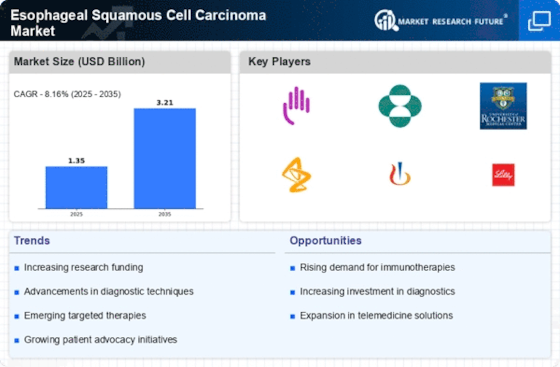Market Analysis
In-depth Analysis of Esophageal Squamous Cell Carcinoma Market Industry Landscape
Many factors shape the Esophageal Squamous Cell Carcinoma (ESCC) Market in the oncology and pharmaceutical industries. The occurrence of esophageal squamous cell carcinoma, a lining cancer, drives this market. Due to its expanding prevalence, ESCC is a global health issue that requires improved diagnostic and therapy methods. Regional ESCC rates affect market dynamics, with Eastern Asia having greater rates. Medical research and technology shape the ESCC market. Diagnostic, imaging, and genetic profiling advances help detect and manage ESCC, affecting the market.
Development and commercialization of esophageal squamous cell carcinoma diagnostics and treatments depend on regulatory issues. Healthcare professionals and patients trust diagnostic tests and medicines due to strict regulatory standards. Pharmaceutical businesses must comply with regulations to market ESCC-related goods, which affects market competition.
Economics strongly affect the ESCC market. Economic growth and stability enhance healthcare spending, improving esophageal squamous cell carcinoma diagnosis and treatment. Conversely, economic issues may impact healthcare expenditures, affecting ESCC therapy availability and affordability. Economic factors influence the development of affordable and accessible early detection screening technologies.
Another important market component is pharmaceutical, diagnostic, and research institution competition. Competitive pressure drives companies to produce new esophageal squamous cell carcinoma treatments, diagnostics, and agents. As companies aim to improve their research, product portfolios, and ESCC market position, collaborations, partnerships, and clinical trials influence the competitive landscape.
Healthcare professionals, patients, and researchers' consumer preferences affect the ESCC market. Oncologists and doctors may choose effective, safe treatments. Patients may value medicines that improve quality of life and survival. For individualized treatment, researchers and physicians prioritize accurate and rapid diagnostic tools. ESCC companies respond to these desires by investing in R&D, clinical trials, and patient-centric product development.
Health policy and reimbursement also shape the ESCC industry. Healthcare policies, insurance coverage, and reimbursement may affect access to novel therapies and diagnostics. Healthcare systems must adapt to changing esophageal squamous cell carcinoma diagnosis and treatments to ensure timely access to effective treatments.


















Leave a Comment